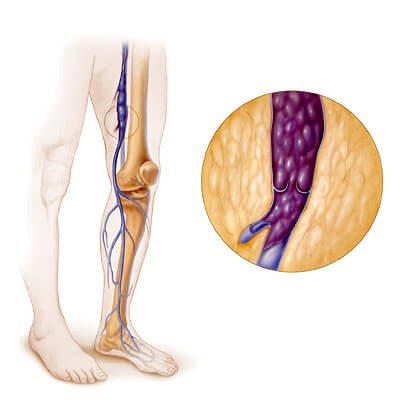 Venous thrombosis is one of the most dangerous conditions aggravating many chronic diseases, particularly, varicose veins. Why is this ailment considered to be life threatening? The fact is that the blood clots formed in the vein can block the bloodstream to vital organs. To find out if there is a threat of venous thrombosis to you, take our small test. Only 10 questions will help to understand whether you need to pay more attention to your health.
Venous thrombosis is one of the most dangerous conditions aggravating many chronic diseases, particularly, varicose veins. Why is this ailment considered to be life threatening? The fact is that the blood clots formed in the vein can block the bloodstream to vital organs. To find out if there is a threat of venous thrombosis to you, take our small test. Only 10 questions will help to understand whether you need to pay more attention to your health.
- Do you suffer from blood disorders?
- Do you or your close relatives suffer from atherosclerosis?
- Do you have varicose veins?
- Do you often suffer from high blood pressure?
- Are you overweight or obese?
- Do you have harmful habits smoking, alcohol abuse?
- You lead a sedentary lifestyle?
- Do you often have to sit for a long time at a computer or in a car?
- Do you take oral contraceptive pills or other hormonal medications?
- Are you pregnant?
If your answer is "yes" to one of the first four questions or two questions from 5 to 10 you are at risk, so there is an acute need to visit your health care professional for an advice and to get instructions for venous thrombosis prevention. But if the answer is "no" to all questions you are unlikely to face this ailment, but it’s still important to undergo appropriate tests every year to make sure that your health is Ok and not at risk.
Symptoms of venous thrombosisIn half of the cases, the onset of thrombosis proceeds almost asymptomatically, depending on the location of the thrombus, blood often passes unhindered inside the vein without causing a bad feeling. In other cases, the following manifestations might be observed:
- Swelling of the feet
- Painful discomfort in the thrombus-affected area
- Pain when touching the affected area, which increases along the veins
- Hyperthermia or redness at the location of the thrombus
- Swelling of the surface of veins
Who is facing vein thrombosis?First of all, the development of venous thrombosis affects pregnant women and mothers in the first 4-6 weeks after childbirth. At this time, the blood level of the hormone estrogen increases, which worsens blood fluidity, which is fraught with the formation of blood clots. Moreover, because of the pressure of the uterus, blood circulation in the pelvic organs is disturbed, which further increases the risk of developing the disease.
Tendency to deep vein thrombosis is also transmitted genetically. However, no need to panic if your mother or grandparents suffered from this ailment. The presence of cases of thrombosis in a family history is not a sentence.With genes, only a predisposition to thrombosis is transmitted, which, with due care for your health and some precautions, makes your risks of getting thrombosis even lower than other’s people who treat possible risks of thrombosis more negligently.
The risk of this ailment increases in case of a trauma, infections and surgical interventions that affect the rheological properties of the blood and literally ruins the inner wall of the veins. Also, the situation worsens even more against the background of the use of certain substances, in particular hormonal medications, alcohol abuse and smoking.
Treatment of venous thrombosisDepending on how bad is your case, the methods of treatment suggested by your physician might vary.
- Reception of anticoagulants. This is the most common approach to the treatment of venous thrombosis. In numerous cases, specialists prescribe Warfarin as this product proved to be very effective. Medications for the liquefaction of blood prevent the formation of new blood clots and give the organism the opportunity to get rid of the already existing ones. By themselves, these blood clots do not dissolve.
- Anti-inflammatory therapy. Also, a medical professional can prescribe the use of non-steroidal anti-inflammatory drugs, in the event that a focal process has begun to develop at the site of the thrombus.
- Installing the cava filter. If you, for some reasons, cannot take medications to dilute blood or you have used them but with no effect, your physician may recommend that you install a cava filter in the largest vein. It does not let the blood clots to get to the vital organs, preventing irreparable consequences.